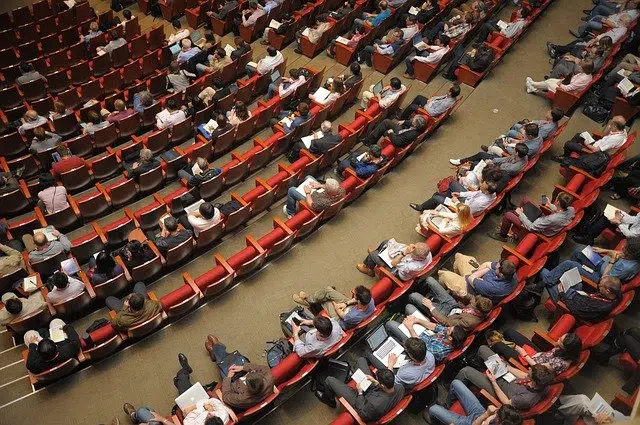
A symposium is a type of event or meeting.
Symposium is a concept that comes from the Greek language. The term refers to a meeting where a certain issue is analyzed.
For example: "Tomorrow a symposium on the new tax legislation will take place in the university's main auditorium" , "Next week I will travel to Mexico to attend a symposium" , "The governor will be the keynote speaker at a symposium on security which will be developed at the National Institute of Public Policies .
Origin of the symposium
It is important to be aware that the origin of the symposium is found in a type of banquet that already took place in Ancient Greece and that was undertaken with the clear objective of being able to celebrate anything from an important event such as a family date to any other event that took place. deemed appropriate.
Specifically, this type of celebration was made up of two clearly delimited parts: a first in which delicacies and various products were enjoyed and a second, in which not only wine was drunk but also in which the attendees enjoyed certain activities such as, for example, music and dance shows.
A long time ago, the symposium saw the light of day in Plato's time; In his dialogue appropriately titled " The Symposium " you can see a great debate in which Socrates and his disciples participate to discuss love, one of the most important topics for our species. In this particular case, these thinkers try to get to the very essence of love.
Although there are not so many differences between this idea of a symposium and the concept we have today, there are certain academic issues that give the contemporary version a more solid structure. One of the most common objectives of the symposium is to find solutions for a certain problem , although it is also common to use it as a means of training or training.

In a symposium a certain topic is debated and analyzed.
An area of debate
A symposium can be linked to a conference or seminar . At the symposium, various specialists meet to debate and analyze a topic . The objective is for each expert to intervene in the debate with their point of view: a coordinator, finally, is in charge of summarizing the main concepts so that attendees can draw their own conclusions and leave the event enriched.
The public attending the symposium has the opportunity to ask questions to the speakers. In this way, the symposium is interactive and its conclusions are constructed in a participatory manner.
Symposium types
Symposiums of all kinds are held in many areas and sectors. Thus, for example, they have a special role in the field of art to address certain discoveries or to analyze in depth different jewels. A clear example of all this is the symposium that has recently been organized around what is the Portico of Glory, of the Cathedral of Santiago de Compostela. Researchers, artists and professionals in this field, as well as simple amateurs, have been able to attend it where they have learned about everything from the characteristics of that place to the curiosities that surround it or the recovery work to which it has been subjected.
However, there are many fields where symposia are held as a way to strengthen ties between their professionals and for everyone to be up to date with the latest developments and most relevant aspects of those mentioned.
The importance of supporting a position
It is common that, in a symposium, participants appeal to research and studies to support their positions. This differentiates this type of events from others that are more oriented towards subjectivity in the treatment of topics. In any case, we should not downplay the importance of the relationship that exists between the subjectivity of the participants, the aforementioned research work and the way in which the data obtained in this way is analyzed.
Symposia can focus on any area of knowledge or issue of social interest, from politics to medicine , including sports , economics , art and history , to name just a few possibilities.
Organization and development of the symposium
The first step in organizing a symposium is to gather a group of specialists who have the knowledge and experience necessary to determine and develop the topics to be discussed. It is important to note that it should always be structured around a main theme , and then branch out into others that are linked to it.
Given that the symposium is not an informal talk or a spontaneous meeting , the second step consists of developing a program and a calendar , where it is possible to detail the schedules of the exhibitions, as well as the extension of each one and other relevant information. The size of the symposium is another fundamental point: for example, if it is a considerable one, it is possible to give more than one conversation at the same time, each one in a different room. It is recommended not to allocate more than 1 hour to each segment and to allocate the last quarter to a question and answer session .
Then comes the time for the call for papers, something that can be done in any publication dedicated to the main topic of the symposium, both in paper and digital format, among other media. Next, we must choose the best articles and organize the work according to the calendar, contemplating the participation of a moderator.
